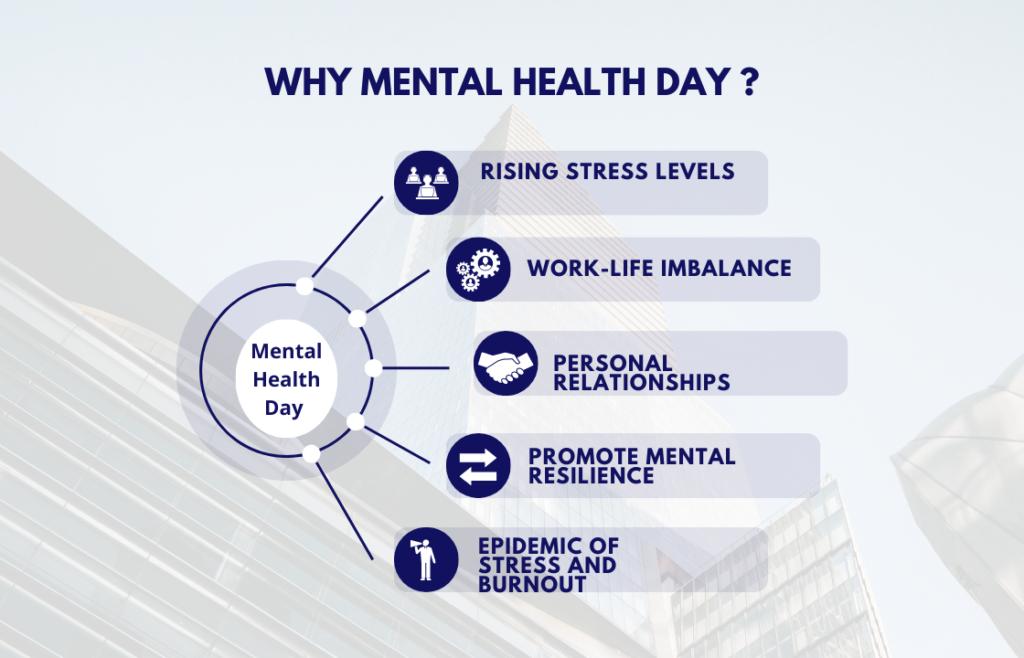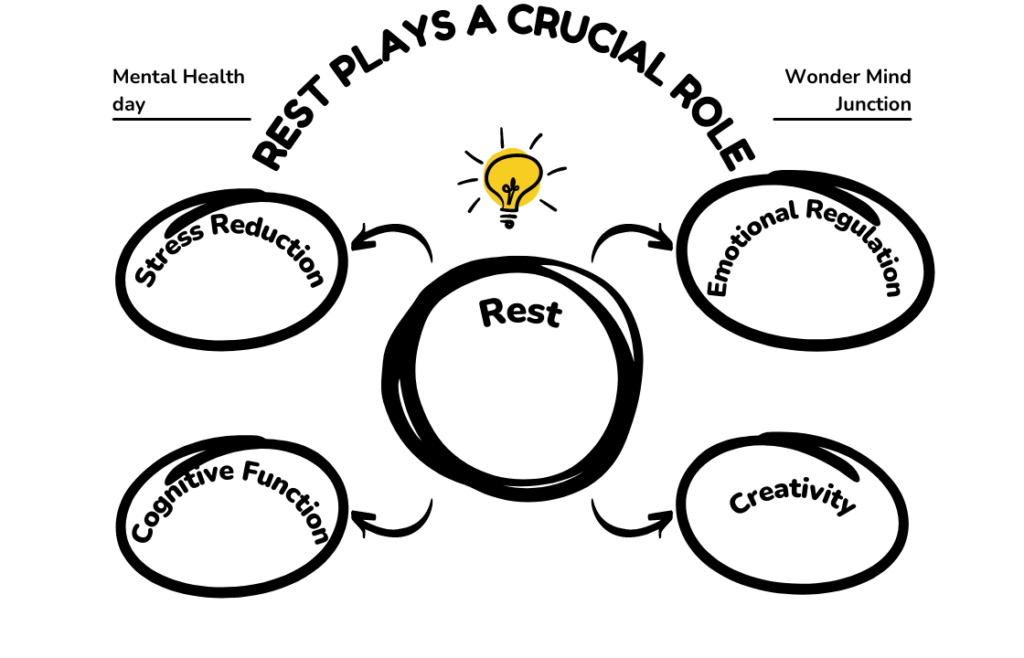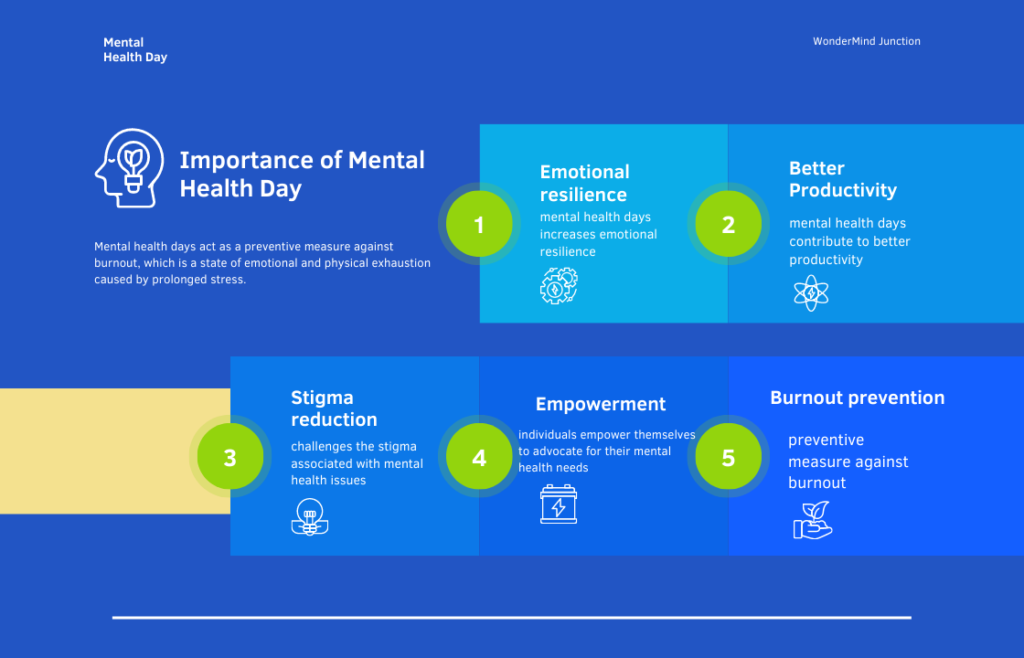Harnessing the Healing Power of Rest, A Deep Dive into Mental Health Day
In the modern age of rapid technological advancement and constant connectivity the concept of Mental Health Day has emerged as an important tool to balance the demanding and fast-paced nature of our lives. These days represent a proactive approach to preserve and nurture our mental well-being amid the hustle and bustle of daily responsibilities.
Understanding Mental health Day
A mental health day is a designated period of time, usually a day off from work or other obligations, during which a person intentionally focuses on their own mental and emotional needs. Unlike traditional vacation days, which may be spent meeting work or obligations, mental health days are specifically aimed at rejuvenation, self-care, and stress relief.
The importance of Mental Health Day is especially evident in the context of our modern,fast-paced world

Table of Contents
Rising Stress Levels:
Due to the fast pace of life as well as increasing demands of work and personal life, stress levels have increased in many people. Mental Health Days provide an opportunity to reduce this stress and prevent it from escalating into more serious issues.
The advent of technology has kept us constantly hooked to our devices, blurring the boundaries between work and personal time. This constant connectivity can contribute to fatigue and feelings of being overwhelmed. Mental Health Days allow for intentional separation from digital distractions.
Work-life Imbalance:
The pursuit of professional success is often at the expense of personal well-being. Mental Health Days help rebalance this balance by encouraging individuals to prioritize their emotional needs and engage in activities that bring them joy and comfort.
Promote mental resilience:
Regular mental health days can build emotional resilience. By giving ourselves permission to retreat and recharge, we equip ourselves with the emotional strength to face challenges and setbacks with greater clarity and perspective.
Shift in Cultural Attitudes:
The conversation about mental health has evolved significantly, reducing the stigma associated with discussing emotional well-being. Mental Health Day marks a shift toward active self-care and self-awareness, allowing individuals to openly acknowledge their need for rejuvenation.
Improved Performance:
Studies show that taking breaks, including mental health days, can improve productivity and creativity. By allowing our minds to rest and recharge, we return to our tasks with renewed energy and focus.
In a world that often prioritizes productivity and achievement at the expense of mental wellness, Mental Health Days stand as a counterbalance. They remind us that taking care of our mental health is not a luxury but a necessity. By embracing these days, individuals acknowledge their own self-worth and the importance of maintaining a harmonious relationship between their emotional and external worlds. As we grapple with the complexities of modern life, Mental Health Day offers a ray of solace, reminding us that in the midst of the chaos, there is always room for self-care and restoration.
Increasing need for prioritizing mental well-being with Mental Health Day due to stress and burnout
Here are some key takeaways on the growing need to prioritize mental wellness in the face of stress and burnout:
Epidemic of stress and burnout:
The relentless pace of modern life has given rise to an epidemic of stress and burnout across various age groups and occupations. The constant pressure to meet deadlines, achieve goals and maintain a busy schedule has taken an adverse effect on mental health.
Physical and mental health connection:
Research consistently shows that mental and physical health are intertwined. Chronic stress and irritation can lead to a weakened immune system, cardiovascular problems, and even long-term psychological conditions such as anxiety and depression.
Impact on the workplace:
Stress and fatigue have a significant impact on the workplace. Decreased productivity, increased absenteeism and decreased job satisfaction are some of the consequences. Prioritizing mental wellness can lead to a more engaged and productive workforce.
Personal Relationships:
The stress of stress and fatigue is not just confined to the workplace. This can spill over into personal relationships, causing conflict, reduced quality time with loved ones, and an overall decreased sense of well-being.
Quality of Life:
Prioritizing mental wellness is about enhancing one’s quality of life. It’s about having the emotional reserves to fully experience life’s moments, finding joy in daily activities, and meeting challenges in a healthy way.
Early Intervention:
Proactively addressing mental well-being can prevent stress and burnout from escalating into more serious mental health conditions. Early intervention, such as taking a mental health day or engaging in stress-reducing activities, can be key to maintaining balance.
Mind-body connection:
Our mental state affects our physical health, and vice versa. Engaging in activities that promote mental well-being, such as mindfulness, meditation and exercise, can have a positive effect on both our mental and physical health.
Social impact:
A collective focus on mental well-being can have wide-ranging social benefits. Reduced stress and burnout can lead to a happier, more engaged society, fostering creativity, innovation and social cohesion.
Resilience and Coping:
Prioritizing mental wellbeing equips individuals with coping skills and emotional resilience. This enables them to better deal with life’s challenges, adapt to change and maintain a positive attitude.
Holistic Health:
True health includes not only physical fitness, but also mental and emotional well-being. Prioritizing mental well-being contributes to a more holistic and balanced approach to health and life.
In an age where life’s demands often seem overwhelming, recognizing the need to prioritize mental wellness is a proactive step toward a healthier and happier future. Dealing with stress and burnout not only benefits individuals on an individual level, but also has far-reaching positive effects on workplaces, relationships, and society as a whole.
How rest plays a crucial role in nurturing mental health and overall well-being on mental health day

Rest is not merely a break from activity; It is an essential component of maintaining good mental health and overall well-being. In a world that often glorifies constant productivity and busyness, it is important to understand the role of rest in nurturing mental health in order to achieve a balanced and fulfilling life.
Physical and Mental Rehabilitation:
Rest is a time when our body and mind can recover from the wear and tear of daily life. During rest, our muscles repair, energy levels replenish, and our brains have a chance to process emotions and experiences. Just as physical rest rejuvenates our bodies, mental rest revitalizes our minds, allowing us to think more clearly and creatively.
Stress Reduction:
Relaxation provides freedom from the constant cycle of stress-causing hormones in our bodies. Whether it’s a good night’s sleep, moments of relaxation, or a day off, rest reduces the physical and psychological effects of stress, giving our brains a chance to reset.
Cognitive Function:
Fatigue and exhaustion interfere with cognitive function, affecting memory, attention, decision-making and problem-solving abilities. Quality rest enhances cognitive performance, allowing us to approach challenges with a clearer mind and make more informed choices.
Emotional Regulation:
Comfort plays an important role in emotional regulation. When we’re tired, emotions can run high, leading to impulsive reactions and mood swings. Adequate rest promotes emotional stability, helping us to manage stressors and react more calmly to challenging situations.
Creativity and Problem-Solving:
Relaxation allows the mind to wander and make new connections. Many creative breakthroughs and innovative ideas happen when we are away from the constant demands of work. A well-rested mind is more open to inspiration and better equipped to tackle complex problems.
Relationships and Communication:
Fatigue can cause strain in relationships by eroding our patience and empathy. When well-rested, we are more capable of active listening, effective communication, and meaningful interactions with others.
Effects on Physical Health:
The mind and body are interconnected, and neglecting mental comfort can lead to physical consequences. For example, lack of sleep can lead to various health problems, including a weakened immune system, cardiovascular problems, and weight gain.
Balancing effort and rest:
Just like muscles need recovery after exercise, similarly our mind also needs rest after some period of effort. Maintaining a balance between engagement and relaxation prevents fatigue and promotes a sustainable approach to life’s challenges.
In short, rest is not a luxury but a basic necessity to maintain mental health and overall well-being. Prioritizing comfort enables us to live life with flexibility, clarity, and vitality. By recognizing rest as an integral part of self-care, we empower ourselves to live healthier, more fulfilling lives.
The Foundation of Mental Health Day
What is a mental health day is and how it differs from regular days off ?
A mental health day is a designated period, often a single day, during which a person takes a break from their normal routine to focus on their emotional and psychological well-being. Unlike regular vacation days, which can be used for a variety of activities or obligations, Mental Health Days specifically aim to engage in self-care practices to reduce stress, reduce burnout, and promote mental rejuvenation. to be attached. Making mental health a priority and engaging in activities that promote relaxation, mindfulness, and emotional recharge is a deliberate choice.
Common misconceptions about mental health days and why they are essential.
Misconception: Mental Health Days are for the weak:
Some people mistakenly believe that celebrating Mental Health Day is a sign of weakness or inability to handle stress. This misconception perpetuates the stigma surrounding mental health and prevents individuals from finding the comfort they truly need.
Myth: Mental health days are unproductive:
There’s a myth that productivity must be constant, and any break from work is unproductive. In fact, mental health days increase productivity by preventing fatigue, improving focus, and promoting overall well-being.
Misconception: Mental health days are only for serious issues:
Mental health days are not reserved only for serious mental health challenges. The everyday stresses and demands of modern life can accumulate, requiring a mental health day to prevent minor stressors from turning into major issues.
Myth: Mental health days are self-indulgent:
Some people feel guilty for taking time for themselves, seeing it as self-indulgence. However, self-care, including mental health days, is essential to maintaining one’s overall health, flexibility, and ability to meet responsibilities.

Why Mental Health Days are important
Mental health days act as a preventive measure against burnout, which is a state of emotional and physical exhaustion caused by prolonged stress. By quickly recognizing and addressing stress through these pauses, individuals can maintain their well-being and performance.
Burnout prevention:
Emotional resilience:
Taking regular mental health days increases emotional resilience, enabling individuals to face challenges more effectively. This resilience helps maintain a positive outlook and manage stress with greater clarity.
Better Productivity:
Contrary to misconceptions, mental health days contribute to better productivity. A well-rested mind is more focused, creative and efficient, which leads to better work performance and engagement.
Stigma reduction:
The adoption of Mental Health Day challenges the stigma associated with mental health issues. Open discussions and actions related to mental well-being promote understanding, compassion and support in workplaces and communities.
Increase in overall well-being:
Mental health days contribute to a healthy work-life balance, stronger relationships, and increased life satisfaction. They encourage individuals to prioritize their needs, which leads to overall well-being.
Empowerment:
By recognizing the need for Mental Health Day and taking steps for their own well-being, individuals empower themselves to advocate for their mental health needs and demonstrate self-care as an important aspect of life.
Finally, dispelling misconceptions about mental health days is critical to fostering a culture of wellness and self-care. These pauses are not signs of weakness or self-indulgence; They are essential tools for maintaining mental health, preventing fatigue, and living a more balanced and fulfilling life.
The Science of Rest and Mental Health
The scientific connection between rest, relaxation, and improved mental health lies in the complex interplay of brain function, hormonal balance, and emotional well-being. During rest and relaxation, several key processes occur:
Stress hormone regulation:
Relaxing activities lead to a decrease in stress hormones such as cortisol. It helps reduce the physical and psychological effects of chronic stress, thereby calming the mind and reducing anxiety.
Neurotransmitter balance:
Relaxation promotes the release of neurotransmitters such as serotonin and dopamine, which play important roles in mood regulation and emotional stability. Balanced levels of these neurotransmitters contribute to a positive outlook and emotional resilience.
Brainwave Patterns:
Different states of rest, such as deep sleep and meditation, produce different brainwave patterns. These patterns promote neural synchronization, facilitating cognitive processing, memory consolidation, and emotional processing.
Autonomic nervous system balance:
Rest and relaxation activate the parasympathetic nervous system, which balances the fight-or-flight response of the sympathetic nervous system. This state promotes a feeling of calm, slower heart rate, and lowering of blood pressure.
Decreased inflammation:
Chronic stress is associated with increased inflammation in the body, which can impact mental health. Relaxation techniques have been shown to reduce inflammation, potentially reducing symptoms of depression and anxiety.
Neuroplasticity enhancement:
The brain’s ability to reorganize itself, known as neuroplasticity, is affected by relaxation practices. Engaging in leisurely activities aids in neuroplasticity, cognitive flexibility, and adaptation to new challenges.
Emotional Regulation:
Relaxation techniques encourage mindfulness and present-moment awareness. These practices enhance emotional regulation, allowing individuals to manage and respond to emotions in healthy ways.
Quality of Sleep:
Quality sleep is an important aspect of rest and relaxation. Sleep enables the brain to process information, consolidate memories, and regulate emotions, which improves mental health outcomes.
The role of rest in stress reduction, cognitive function enhancement, and emotional well-being.
Role of rest in reducing stress:
Relaxation plays an important role in reducing stress by resetting the body’s stress response system. During periods of rest, the production of stress hormones such as cortisol decreases, leading to a decrease in physiological arousal. This decrease in stress hormone levels promotes a feeling of calmness and relaxation, which counteracts the negative effects of chronic stress. Adequate rest also supports restoration of the autonomic nervous system, shifting the body from “fight or flight” mode (sympathetic) to “rest and digest” mode (parasympathetic), thereby reducing stress-related physiological responses.
Role of relaxation in enhancing cognitive function:
Rest is essential for enhancing cognitive function. During periods of rest, especially quality sleep, the brain consolidates memories, processes information, and flushes out waste products accumulated throughout the day. This process aids in memory retention, learning and problem-solving. In addition, rest supports the brain’s neuroplasticity—its ability to form new neural connections and adapt to new information. Adequate rest ensures that cognitive resources are replenished, promotes sustained focus, improves decision making, and increases creativity.
The Role of Comfort in Emotional Well-Being:
Rest has a profound effect on emotional well-being. During rest, especially during the stages of deep sleep, the brain processes emotions and regulates mood. Emotional experiences throughout the day are consolidated and integrated, contributing to emotional resilience. Lack of rest can lead to emotional dysregulation, increasing the likelihood of mood disorders such as anxiety and depression. Adequate rest also supports the brain’s reward system, releasing neurotransmitters associated with positive feelings, thereby promoting emotional well-being. Practicing relaxation techniques, such as mindfulness or meditation, during waking hours promotes emotional regulation and reduces emotional reactivity.
Signs That You Need a Mental Health Day
Recognizing when you need a mental health day is an important step in taking care of your well-being. Here are some signs that indicate that now is the time to make self-care a priority and consider celebrating Mental Health Day:
Persistent fatigue:
If you are constantly feeling tired despite getting enough sleep, it could be a sign of mental and emotional exhaustion. A mental health day can provide the rest you need to re-energize.
Irritability and mood changes:
Unexplained irritability, mood swings, or increased emotional sensitivity may indicate that your mental health needs attention. Taking a break can help you regain emotional balance.
Decreased productivity:
If you find it challenging to concentrate, make decisions, or complete tasks, it could be a sign of burnout. A mental health day can boost your cognitive function and productivity.
Physical symptoms:
Headaches, muscle tension, stomach problems and other physical symptoms can be a manifestation of stress affecting your body. A mental health day can help reduce these symptoms and prevent them from getting worse.
Lack of motivation:
When activities you once enjoyed lose their allure and you feel unmotivated to engage in them, it is a sign that you need a break to rejuvenate your interests. may be required.
Increased anxiety:
If you are experiencing elevated levels of anxiety, racing thoughts, or difficulty managing stress, this is a clear indicator that your mental health is struggling. Taking time off can help reduce anxiety and promote relaxation.
Difficulty Sleeping
Insomnia or disrupted sleep patterns can be both a cause and a consequence of poor mental health. A mental health day can support better sleep habits and address underlying issues.
Social isolation:
If you are isolating yourself from friends and family, it could be a sign that you are feeling overwhelmed. Celebrating Mental Health Day can give you an opportunity to connect and find support.
Feeling overwhelmed:
If your to-do list seems insurmountable, and you’re constantly feeling overwhelmed by responsibilities, Mental Health Day can provide you with the time and space to regroup and set priorities.
Loss of enjoyment:
When things you once found enjoyable lose their enjoyment, it is a sign that you are not experiencing life to the fullest. A mental health day can help you reconnect with activities that bring you joy.
Experiencing emotional numbness:
Feeling emotionally numb or disconnected from your surroundings can be a sign of emotional exhaustion. A mental health day can facilitate the process of reconnecting with your feelings.
Planning Your Mental Health Day
Planning your mental health day is a proactive and empowering step towards self-care. By strategically organizing activities that nurture your well-being, you can make the most of your day off. Here’s a guide to effectively planning your Mental health day:
Assess your needs:
Consider what aspects of your mental health need attention. Are you feeling stressed, tired or emotionally drained? Identifying your needs will guide your planning.
Choose a date:
Choose a date for your mental health day that works with your schedule and responsibilities. Inform your workplace or commitments in advance if necessary.
Set Intentions:
Define the purpose of your mental health day. Is it to relax, pursue a hobby, connect with loved ones or seek new experiences? Setting intentions helps keep you focused on your goals.
Cut ties with work:
Minimize work-related activities. Avoid checking email or engaging in work-related tasks to completely free yourself from your professional responsibilities.
Create a relaxing environment:
Whether it’s at home or a quiet outdoor space, create an environment conducive to relaxation. Clear away clutter, use soothing scents, and set up comfortable spaces for activities.
Practice Mindfulness:
Incorporate mindfulness techniques like meditation, deep breathing or yoga to center yourself and reduce stress.
Engage in Activities:
Plan activities that bring you joy and relaxation. This could include reading, spending time in nature, taking a relaxing bath, listening to calming music, or pursuing a creative endeavor.
Prioritize self-care:
Focus on self-care rituals like eating healthy, staying hydrated, and getting enough sleep. Nourishing your body helps with your mental well-being.
Limit Screen Time:
Minimize exposure to digital devices, social media and news to avoid unnecessary stress and promote digital detox.
CONNECT WITH LOVED ONES:
Spend quality time with friends, family or pets. Meaningful relationships contribute to emotional well-being.
Engage in physical activity:
Incorporate light exercise, such as walking or light stretching, to release endorphins and improve mood.
Reflect and Journal:
Take time to reflect on your feelings, thoughts, and experiences. Journaling can help you process your feelings and gain insight.
Unplug:
Disconnect from digital distractions for a significant portion of the day. Allow your mind to rest without constant stimulation.
Practice Gratitude:
Develop gratitude by acknowledging the positive aspects of your life. Gratitude enhances well-being and takes the focus off of stressors.
Set boundaries:
Let the people around you know your boundaries. Tell them you’re celebrating Mental Health Day and need some space to freshen up.
Evaluate Your Day:
Reflect on how your mental health day went. Do you feel more relaxed? Which activities were most beneficial? Use these insights to refine future mental health days.
Activities for a Restorative Mental Health Day
Indulging in restorative activities on Mental Health Day can rejuvenate your mind and nurture your emotional well-being. Consider:
Mindfulness and Meditation:
Practice mindfulness exercises or meditation to focus your thoughts, reduce stress, and increase self-awareness.
Nature Walk:
Spend time outside, enjoying the calming effects of nature. Take a leisurely walk or sit in a park.
Creative Purpose:
Engage in a creative medium, such as painting, writing, or playing a musical instrument, to express yourself and stimulate your mind.
Reading:
Read a book that interests you. Reading can take you to different worlds and provide a mental release.
Relaxing Bath:
Enjoy a relaxing bath with a calming scent like lavender or chamomile to relax and unwind tense muscles.
Yoga or stretching:
Light yoga postures or stretches relieve physical tension and promote relaxation through mindful activity.
Breathing Exercises:
Practice deep breathing techniques to reduce anxiety and increase mental clarity.
Journaling:
Write down your thoughts, feelings, and reflections to gain insight, process emotions, and organize your mind.
Digital detox:
Disconnect from electronic devices to reduce digital-related stress and engage in present-moment activities.
Listening to music:
Listen to calming music or your favorite tunes to lift your mood and create a soothing environment.
Spending time with loved ones:
Connect with friends, family, or pets to foster emotional connection and support.
Cooking or Baking:
Engage in cooking or baking, which can be a therapeutic and creative way to spend your day.
Nap:
If restful sleep is challenging, a short nap can recharge your energy level and improve mood.
Spa Day at Home:
Pamper yourself with self-care rituals like a skin care routine, massage and relaxation techniques.
Mindful eating:
Eat a healthy, balanced diet with mindful taste, focusing on each meal and nourishing your body.
Visualization Exercises:
Practice visualizing positive scenarios and outcomes to reduce anxiety and increase optimism.
Volunteer or help others:
Engaging in acts of kindness or volunteering can boost your mood by fostering a sense of purpose.
Embracing Disconnect in a Hyperconnected World
In an age of constant connectivity, true rest often requires conscious disconnection. Make a conscious effort to put away your devices, sign out of work-related apps, and immerse yourself in the present moment. Engage in activities that nourish your soul and create a sense of peace.
Reflecting and Looking Ahead
As your mental health day comes to an end, take a moment to reflect on your experience. Describing in a journal what made you most happy, what made you real and how you feel compared to the start of the day. Take These Thoughts Forward – Let Them Comfort and Self-Care
Overcoming Guilt and Nurturing Growth
Guilt and stigma around self-care can cast a shadow on our mental health day. Remember that taking care of yourself isn’t selfish; It is essential for your overall well-being. Accept the fact that you are more productive and resilient when you are well-rested and emotionally balanced.
Sustaining Well-Being Beyond the Day
Mental Health Day is an important step towards developing a sustainable self-care practice. Don’t limit the benefits of rest to just one day – incorporate elements of your mental health day into your daily life. Build a toolkit of self-care practices that coincide with yours, and don’t hesitate to return to them whenever you need encouragement.
In Conclusion
As the world continues to spin around us, remember that you have the power to pause and prioritize your mental well-being. Mental Health Day is a gift you give to yourself – a day to recharge, reflect and reconnect with what really matters. By harnessing the healing power of rest, you equip yourself with the tools to overcome life’s challenges with grace and resilience. So, make that commitment to yourself and watch how your mental health develops.




Pingback: Learn Progress Learning explained in Detailed version